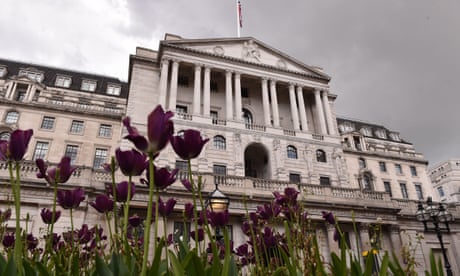
The Bank of England’s recent record of forecasting inflation and the path of interest rates was undermined by out-of-date methods and a failure to communicate clearly with the public, according to a bruising independent assessment.
The report by the former US Federal Reserve boss Ben Bernanke said the Bank spent much of its time attempting to justify its poor judgment rather than admit its failures and change course.
Accusing the Bank of appearing to “at times suffer from excessive incrementalism”, he said policymakers had raised rates too slowly over the past two years when it was clear inflation was already rising beyond normal levels.
Bernanke said the Bank relied on old software to process information and failed to consult staff who were often overworked and inexperienced.
Setting out 12 recommendations, Bernanke said the forecasting errors by the Bank “were hardly unique” among central banks in the developed world.
The Bank of England was the first to react to rising inflation when it began raising interest rates in December 2021, long before the US Federal Reserve or the European Central Bank.
However, Bernanke’s criticism centres on a resistance inside Threadneedle Street to ramping up its efforts in the summer of 2022, when sanctions against Russian oil and gas and a blockade of Ukrainian wheat after Moscow’s invasion triggered a dramatic rise in the cost of energy and food.
The Bank persisted with incremental increases in interest rates while other central banks moved swiftly to raise the cost of borrowing with a view to restricting spending and bringing inflation back to their target.
The Bank of England aims to maintain the consumer prices index (CPI) at 2% and must explain to the chancellor when the CPI rises above 3%. Inflation soared throughout 2022, peaking that November at 11.1%. It has come down slowly since and remains above target at 3.4%.
Bernanke said Bank staff had used “human judgments that paper over problems with the models”.
The governor, Andrew Bailey, said the Bank’s methods were appropriate during more settled times before the coronavirus pandemic but it was clear the recent uncertainty had triggered a more volatile global economic that called for a revamp of its policymaking and operations.
Bailey said he accepted the 12 recommendations and the Bank had already begun to overhaul its IT systems and modelling of the economy to improve the forecasting of inflation and interest rates.
He said: We welcome this important review and its recommendations. This is a once-in-a-generation opportunity to update our approach to forecasting, and ensure it is fit for our more uncertain world. We have set out our initial response today and are committed to taking action on all of Dr Bernanke’s recommendations.”
David Roberts, the chair of the Bank’s court of directors, which oversees its operations, said: “It is crucial that the Bank continuously learns and adapts as an organisation. I would like to thank Dr Bernanke for leading this thorough, independent and objective review into the processes that underpin the MPC’s policy decisions.”
Criticising some of the basic tenets of the UK central bank’s approach to setting interest rates, the report said it should be bolder in telling the public and financial markets how a rise in inflation would affect the judgment of the monetary policy committee (MPC).
A reliance on using the financial market forecasts of inflation as the basis for the Bank’s forecasts was a flawed policy and the MPC should consider devising its own view and communicating that in its decisions.
Bernanke said the likely path of inflation could be uncertain and that should be relayed to the public.
The report said: “The MPC’s central forecast is not a true (unconditional) forecast in that it does not necessarily represent the committee’s collective best guess of what will actually happen in the UK economy. It is instead a projection conditional on a set of assumptions about the likely future course of several key variables, including public spending plans by the government.”
Bernanke said that while this policy allowed the MPC to avoid the potentially sensitive influence of government spending on inflation in its judgment, it could skew the outcome of the committee’s deliberations and lead to an “implausible or wrong” forecast that damaged the Bank’s reputation.